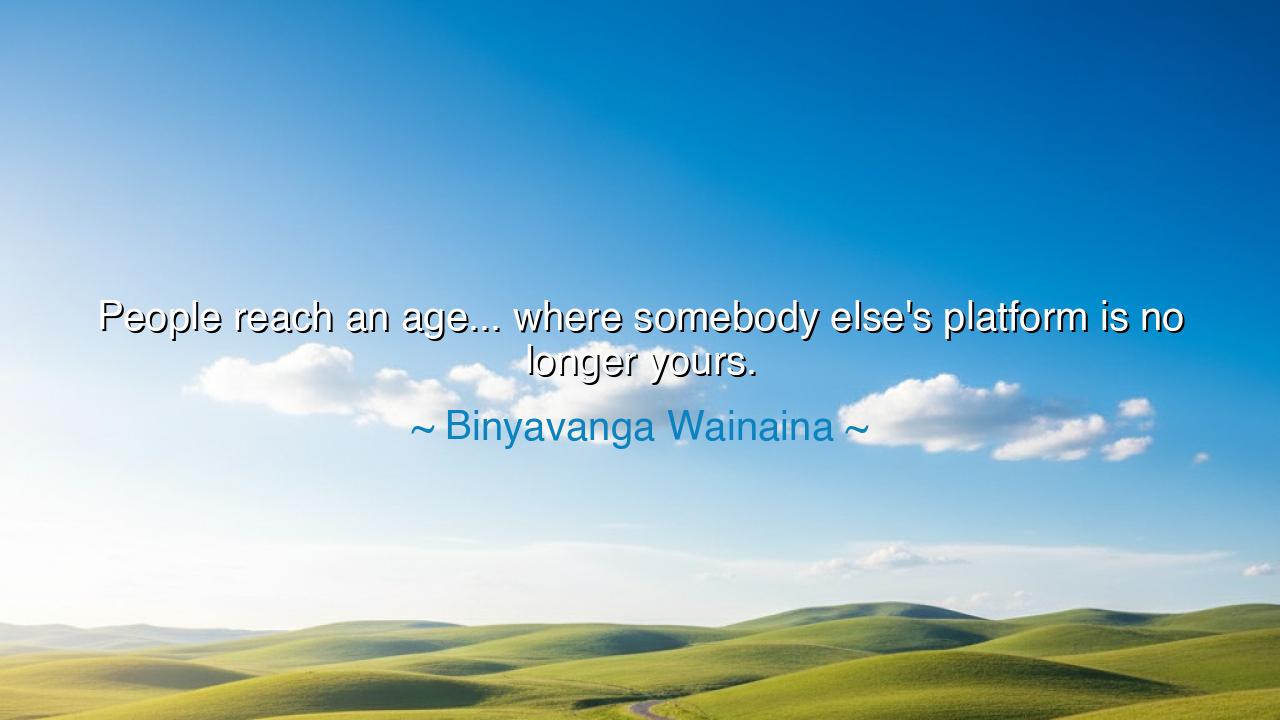
People reach an age... where somebody else's platform is no






The words of Binyavanga Wainaina—“People reach an age... where somebody else’s platform is no longer yours.”—ring with the quiet thunder of self-realization. They speak of the sacred turning point in every human life when one must rise from the shadow of others and claim the light of one’s own voice. To live for too long upon another’s platform—whether it be a parent’s dream, a mentor’s approval, or a society’s expectation—is to live a borrowed life. Wainaina’s wisdom reminds us that a time comes, as surely as the sun climbs the horizon, when we must step down from borrowed heights and begin to build from the ground of our own truth. This is not rebellion, but awakening—the soul’s declaration of independence.
Born in Kenya, Binyavanga Wainaina was himself a maker of platforms, a writer who fought to redefine how Africa was seen and spoken of. His essay, “How to Write About Africa,” pierced the veil of Western stereotypes with wit and fire, reminding the world that Africans are not subjects of another’s story—they are authors of their own narrative. Thus, when he speaks of reaching the age where “somebody else’s platform is no longer yours,” he speaks from the lived wisdom of a man who broke free from the stage others built for him. For too long, his continent, his people, and his own identity were spoken for. And so he learned, as every soul must, that true life begins only when one stops performing for another’s gaze.
There is an ancient echo to his words, one that the wise have known through the ages. Siddhartha, the prince who became the Buddha, walked away from the golden palace of his father to seek truth beneath a bodhi tree. The platform of kingship was not his calling; it was a cage gilded with expectation. Likewise, Socrates refused to bend his philosophy to the will of the powerful, standing firm on the platform of his own conscience even when it led to death. In every age, those who grow into wisdom must at last confront this moment of departure—the choice between living comfortably within another’s order or risking discomfort to live truthfully. Wainaina’s insight, then, is both modern and eternal: there comes a time when one must step away from borrowed voices and dare to speak one’s own.
To live upon someone else’s platform is to dwell within another’s vision of what is worthy, proper, or possible. It may begin in innocence—children walk in their parents’ footsteps, students echo their teachers, citizens inherit their nations’ beliefs. But if this imitation continues unchecked, it becomes a slow forgetting of the self. Wainaina’s “certain age” is not a number but a threshold of consciousness, the moment when the inner voice grows louder than the outer ones. To cross it is to face the fear of solitude, for leaving another’s platform often means losing the safety of applause. Yet that is the necessary courage of maturity—to prefer authenticity to acceptance, and truth to comfort.
There is a story told of Michelangelo, who, as a young sculptor, worked under the patronage of powerful men in Florence. They gave him marble, gold, and fame, but they also dictated what he should carve. One day, weary of constraint, he locked himself alone in his workshop and began to sculpt David, not for any patron, but for the sake of beauty itself. When he unveiled it, the city was stunned—not because it pleased the rulers, but because it was his vision, pure and unmediated. In that moment, he stood no longer on another’s platform, but upon the solid ground of his own genius. This is the essence of Wainaina’s wisdom: that creation—whether of art, identity, or destiny—requires separation from those who would define you.
Yet Wainaina’s quote is not a rejection of others, but a call to evolution. For every platform has its season. We begin by standing on the foundations others built—our teachers, ancestors, and inspirations. But the purpose of learning is not to remain a disciple forever; it is to become a creator in turn. The student who never leaves the master’s house becomes a servant, not a successor. The true master, like a good ancestor, hopes to be surpassed. Wainaina reminds us that honoring those who came before does not mean echoing them—it means carrying their torch into new territories of thought and being.
So let this be the lesson, my listener: do not remain forever upon borrowed platforms. If your voice trembles, let it tremble in your own name. If your path is uncertain, walk it still, for only on your own road will your footsteps sound true. The world may offer you stages, applause, and safety—but none of these can replace the peace that comes from self-sovereignty. Remember this: every platform you inherit is only a bridge, not a home. Cross it with gratitude, then move on to build your own.
And when you do—when you speak not from imitation but from the marrow of your own truth—you will discover what all wise souls have known: that freedom is not the absence of support, but the courage to stand alone. This is what Wainaina teaches us—to honor the platforms of others, but never mistake them for our destiny. For in the end, the highest calling of every human being is not to stand upon another’s stage, but to build one’s own, upon the unshakable foundation of authenticity.






AAdministratorAdministrator
Welcome, honored guests. Please leave a comment, we will respond soon